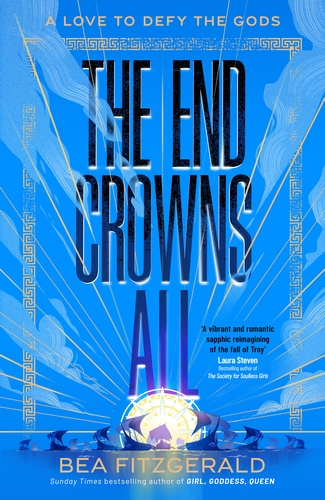The end crowns all by Bea Fitzgerald

The story of Helen and the fall of Troy is probably familiar to most readers, especially those who love Greek mythology. Bea Fitzgerald brings a new perspective to the tale; it is not so much about the war and the great wooden horse, the deception that leads to the Athenian soldiers’ infiltration of the city, but more about the lives of women, Cassandra and Helen in particular.
The two women are two extremes, different responses to the manipulation of men. Cassandra is the proud rebellious princess who refuses any man’s hand in marriage, choosing instead to become a priestess of Apollo, revelling in being the supposed voice of a god.
‘no one will be able to tell me what to do or where to go or anything at all because the voice of Apollo will be heard when I speak'.
Helen, the most beautiful and most coveted woman in the world is used to being the trophy prize of men’s rivalry. She knows she is merely a man’s possession, yet uses all the wiles at her disposal to manipulate the outcomes she wants. The Trojan prince Paris offers her an escape from Sparta and her cruel husband Menelaus, so she takes it. In Troy she meets Cassandra.
Fitzgerald writes in her ‘note from the author’ that her aim was to ‘explore things that I found troubling’, so her fantasy novel discusses ‘consent, rape, rape culture, sexual coercion and sexual assault’, though the scenes are never explicit but implied. She also presents an authentic depiction of asexuality, something that doesn’t get much representation in fiction. Her portrayal of Cassandra is of a woman who is not interested in a sexual relationship with men but seeks romantic emotional attachment without any expectation or understanding of a physical relationship. Despite coming from two different positions in the patriarchy, Cassandra and Helen are drawn to each other and learn from each other.
The relationship between these two aspects of womanhood are the focus of the story. Some readers may find the modern language jarring, and not appropriate to the era being depicted, but the purpose is clearly not to recreate the ancient world, but to use it as vehicle for exploring issues in a patriarchal society, and where an alternative sense of being might fit. That said, I’m sure that many readers will find this portrayal of a Sapphic relationship within a Greek mythology setting completely absorbing and enthralling in itself. Fitzgerald’s book has the potential to appeal to a variety of readers, all of whom will take something away of pertinence for themselves.
The thing that particularly resonated with me as a reader was the idea that, yes, you may know the myth, but history chooses what it recalls. The story of Helen has gone down the years as the great love story of Helen and Paris, escaping from Menelaus, and then his vengeful pursuit. But there may have been a completely different experience of those events that is forgotten from the story. History is the story of the victors. Perhaps there was a different story that has been dropped from memory. Fitzgerald reminds us of alternative perspectives.
Themes: Greek mythology, Asexuality, Prophecy, Women, Patriarchy.
Helen Eddy